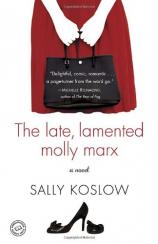Reading Group Guide
Discussion Questions
The Late, Lamented Molly Marx

1. The Late, Lamented Molly Marx grapples with the theme of loss. Molly’s major challenge throughout the book is learning how to let go and come to terms with her death. In what ways has she accomplished this by the end of the novel? In your own life, have you ever had to grapple with loss and letting something go? What helped you?
2. The novel is prefaced by an Oscar Wilde quote: “The true mystery of the world is the visible, not the invisible.” How do you interpret it? How does it apply to the book?
3. The novel presents a version of an after-life. Do you believe in an after-life? If so, what is your vision? How did you arrive at your view?
4. If you could be present at your own funeral, about what would you be most curious?
5. The character of Bob functions as a moral compass and spiritual sherpa for Molly. What do you think Molly gets out of this relationship? Has there ever been a “Bob” in your life and if so, who is it and what role did he or she play?
6. After she arrives in the Duration, Molly discovers that she has what she refers to as “a built-in bullshit detector.” To this Bob responds, “You always had that ability. You just never bothered to activate it.” Do you believe that most people “know” more than they choose to acknowledge?
7. Is Molly mature or immature for her age? Does your opinion of her change as the novel progresses? How do you define maternity? Has how has your definition evolved as you yourself have gotten older? Do you think that adults used to mature faster?
8. Why did Molly marry Barry? Do you know women who marry men who you think aren’t their equal? And the reverse: do you know men who’ve married women you think aren’t their equal.
9. Molly suspects that Barry philanders. Why do women like Molly stay with men like Barry under similar circumstances? Should they have split up? Is he is a good father?
10. Throughout the novel, Molly wonders if she’s made mistakes in her marriage. Do you think she has and if so, what are they?
11. Molly and Barry seek the help of a marriage counselor. Do you think that counseling helped them? In general, do you support the idea of therapy and counseling?
12. How do the women in Molly’s life --- Lucy, Brie, Kitty, her mother, Delfina --- affect her over the course of the novel? What does each woman offer her? In which ways do they ultimately help or hurt her, knowingly or unknowingly? Which women have had the most profound effect on your life?
13. Does becoming a mom help Molly cgrow up? Do you think that she is a good mother? If you have kids, how did you arrive at your notion of what makes a good mother? How does motherhood enrich a woman’s life? Make women’s lives harder?
14. The anthropologist Margaret Mead has observed that the relationship between sisters is often the most troubled one in the family. Mead also says that eventually, the sister relationship becomes the strongest one in the family. Do you agree with Dr. Mead on either of these points? Why do you think that so many sisters can’t get along?
15. How would you describe the friendship with Molly and Brie? What qualities do you think need to be present for women to maintain enduring friendships? Have you ever lost a friendship because of a monumental change in one of your lives?
16. Molly does not enjoy a smooth relationship with her mother-in-law. Why is this relationship often difficult?
17. Who is your favorite character? Why? Your least favorite character? Why?
18. How would you categorize this book --- humor? Mystery? Contemporary women’s fiction?
The Late, Lamented Molly Marx
- Publication Date: June 8, 2010
- Paperback: 336 pages
- Publisher: Ballantine Books
- ISBN-10: 0345506219
- ISBN-13: 9780345506214







